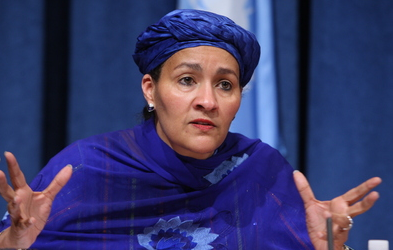During a press conference on the UN Secretary-General's Synthesis Report on the post-2015 development agenda, Amina Mohammed, UN Special Adviser on Post-2015 Development Planning, said the report's six essential elements - dignity, people, prosperity, planet, justice and partnership – are interdependent, must be considered as a whole, and are meant to inspire UN Member States and all stakeholders to agree on a transformative and communicable development agenda.
 8 January 2015: During a press conference on the UN Secretary-General’s Synthesis Report on the post-2015 development agenda, Amina Mohammed, UN Special Adviser on Post-2015 Development Planning, said the report’s six essential elements – dignity, people, prosperity, planet, justice and partnership – are interdependent, must be considered as a whole, and are meant to inspire UN Member States and all stakeholders to agree on a transformative and communicable development agenda.
8 January 2015: During a press conference on the UN Secretary-General’s Synthesis Report on the post-2015 development agenda, Amina Mohammed, UN Special Adviser on Post-2015 Development Planning, said the report’s six essential elements – dignity, people, prosperity, planet, justice and partnership – are interdependent, must be considered as a whole, and are meant to inspire UN Member States and all stakeholders to agree on a transformative and communicable development agenda.
Mohammed noted that the writing of the report, titled ‘The Road to Dignity by 2030: Ending Poverty, Transforming All Lives and Protecting the Planet’ (A/69/700), prioritized intergovernmental inputs, especially that of the Open Working Group (OWG) on Sustainable Development Goals (SDGs) and of the Intergovernmental Committee of Experts on Sustainable Development Financing (ICESDF), but also considered inputs from the UN system and the wider community, including the civil society and global citizens at country and global levels.
Highlighting the “bold, ambitious and truly transformative” nature of the OWG report, she said the “sustainable development agenda has been able to place people at the center and this is underpinned by human rights.” She described development, peace and human rights as the “three interconnected pillars of our work,” and said they will continue to form the foundations on which to respond to ongoing and new challenges that the world faces.
Mohammed called for serious, quick financial commitments and other means of implementation (MOI), and inclusive public mechanisms at all levels for reporting and monitoring progress, learning lessons and ensuring shared responsibility. Noting that the post-2015 is not a legally binding agenda but a normative framework, she stressed the importance of strengthening institutions, capacities and skills at the country level, and of a data revolution to support accountability and participatory decision making. She also underlined the need for a global partnership for implementation that is equitable, inclusive, mutually accountable and includes a fair sharing of responsibilities.
She noted that in 2015, the UN General Assembly (UNGA) has the opportunity to reflect and “cross-correct” for the next decades, but underlined the challenge to continue to involve “those outside these walls” when negotiations become tense and outside issues “come to bear on the floor of the GA as we try to get the ambition required to face these challenges.”
Responding to the press, she clarified that the report is a synthesis of the work carried out by UN Member States, and that its recommendations will be used to push for ambition during the negotiations on the post-2015 development agenda.
As Mohammed remarked, the briefing took place on the same day UN Secretary-General Ban Ki-moon launched the ‘2015 time for global action campaign’ and presented his New Year messages to Member States. [Meeting Webcast] [Publication: The Road to Dignity by 2030: ending poverty, transforming all lives and protecting the planet] [IISD RS Story on Secretary-General Report]